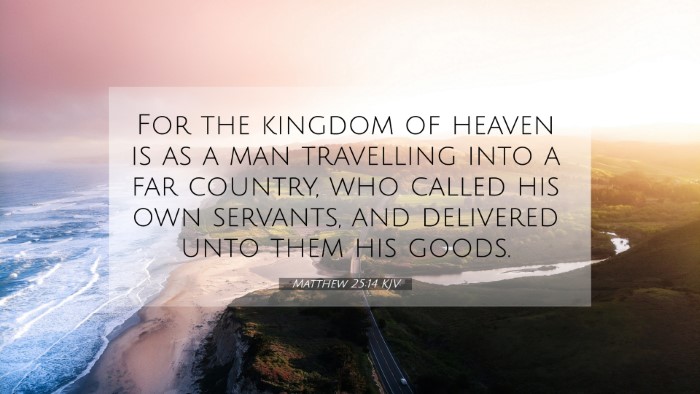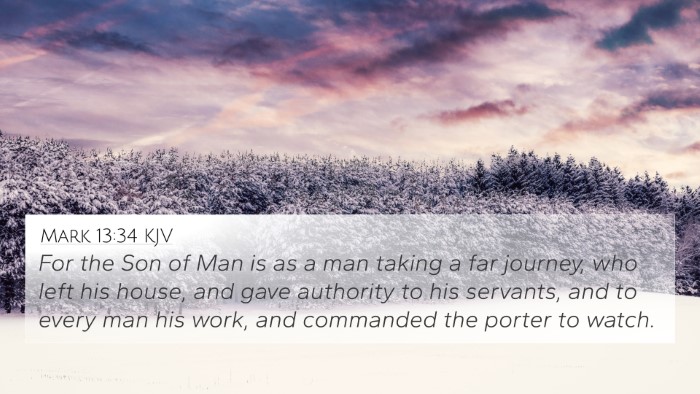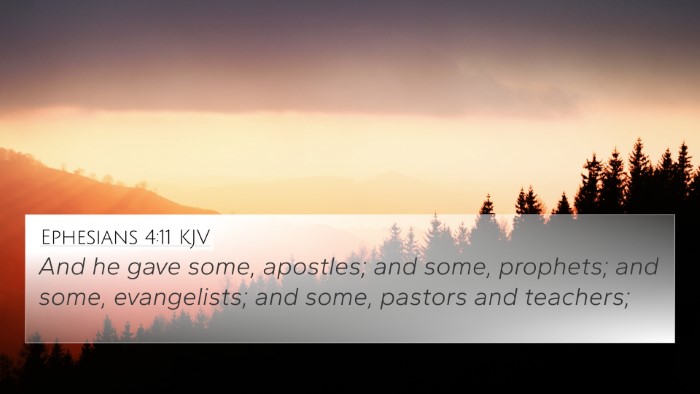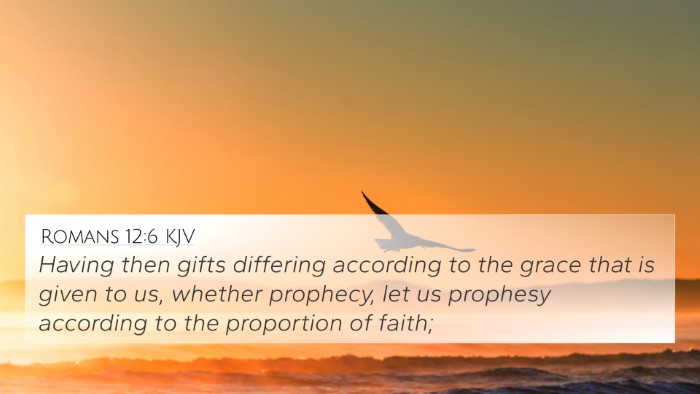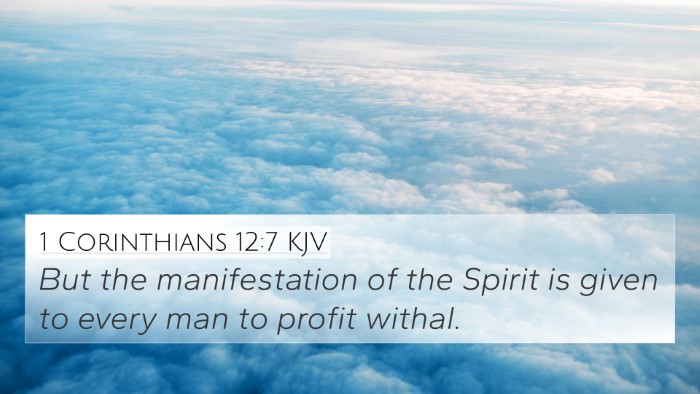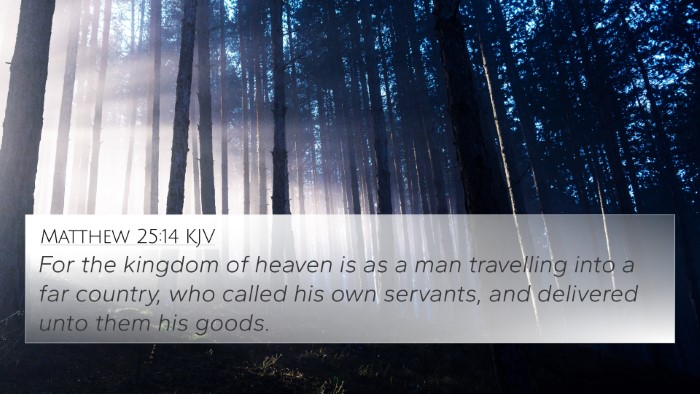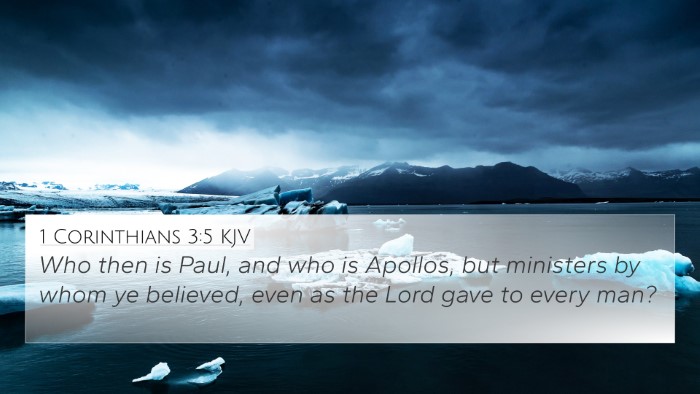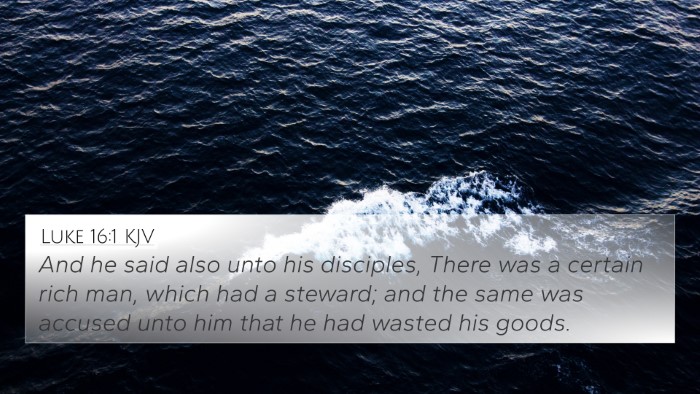Understanding Matthew 25:14
Verse: "For it is as if a man going on a journey summoned his slaves and entrusted his property to them."
Summary of Meaning
Matthew 25:14 introduces the Parable of the Talents, where Jesus illustrates the responsibility that comes with the gifts and resources bestowed upon individuals. The verse suggests a master who goes on a journey and assigns varying amounts of talents (money) to his servants, signifying God's expectation for His followers to use their abilities and resources wisely during their earthly journey.
Key Themes and Insights
- Stewardship: The verse emphasizes the importance of stewardship, where believers are seen as stewards of God's resources and blessings.
- Responsibility: God entrusts individuals with talents according to their abilities, highlighting the responsibility each person has to utilize what they have been given.
- Preparation for Judgment: This parable is a reminder that one day individuals will be held accountable for how they have used what has been entrusted to them.
- Faithfulness: The expectation of faithfulness in handling God’s resources is a central lesson, encouraging believers to act diligently in their tasks.
Bible Verse Cross-References
- Luke 19:12-27: The Parable of the Ten Minas presents similar themes of stewardship and accountability.
- 1 Peter 4:10: Encourages believers to use their gifts to serve others, as good stewards of God's varied grace.
- 2 Corinthians 5:10: Reminds us that we must all appear before the judgment seat of Christ to receive what is due for our deeds.
- Romans 12:6-8: Speaks about differing gifts of grace given to individuals, urging use for the benefit of the community.
- Galatians 6:7-9: This passage highlights that a person reaps what they sow, aligning with the accountability theme in Matthew 25:14.
- Proverbs 21:5: “The plans of the diligent lead surely to abundance, but everyone who is hasty comes only to poverty,” reinforcing the value of careful stewardship.
- Matthew 24:45-51: Discusses the faithful servant, emphasizing the reward for diligence and responsibility.
Connections Between Bible Verses
Matthew 25:14 serves as a critical junction for understanding biblical themes of responsibility, stewardship, and accountability, bridging both Old and New Testament teachings. For example:
- The stewardship principle in Genesis 1:28 where mankind is given dominion over the earth parallels the responsibility noted in Matthew 25:14.
- Matthew 5:14-16 speaks to letting one's light shine before others, relating to the call to utilize one's gifts actively.
- In Ecclesiastes 12:14, the concept of accountability for actions aligns with the overarching message in this parable.
- Exodus 35:30-35 illustrates God's Spirit empowering individuals for work, which connects with the theme of divine enablement in Matthew 25:14.
Bible Study and Cross-Referencing Methods
To enhance understanding of related scriptures, consider these tools and methods:
- Bible Concordance: Use this resource to find words and their occurrences in the Bible to deepen your cross-references.
- Online Study Bibles: Many provide cross-reference tools that assist in exploring related verses.
- Comparative Bible Study: Analyze different translations and interpretations for comprehensive understanding.
- Topical Studies: Conduct studies around themes of stewardship, responsibility, and faithfulness using thematic Bible verse connections.
- Group Studies: Engaging in Bible studies within a community fosters diverse insights and applications of the verse.
Thematic Bible Verse Connections
Engaging with Matthew 25:14 allows for reflection on crucial themes:
- Faithfulness: Consider passages such as Luke 16:10 about being faithful in small things to be entrusted with greater.
- Preparation: Look at 1 Thessalonians 5:2-6 regarding the need for readiness and vigilance.
- Value of Gifts: Explore Matthew 7:7-8 discussing asking and receiving, aligning with the theme of utilizing God-given gifts.
- Community Impact: Acts 2:44-45 illustrates early church members sharing resources, reflecting good stewardship.
Conclusion
In summary, Matthew 25:14 serves as a profound call to stewardship and responsibility in the life of a believer. By understanding the connections between Bible verses and engaging in thematic analyses, we can uncover deeper lessons about the use of our gifts and the expectations of God. Cross-referencing related passages enhances our comprehension and encourages more fruitful spiritual lives.


